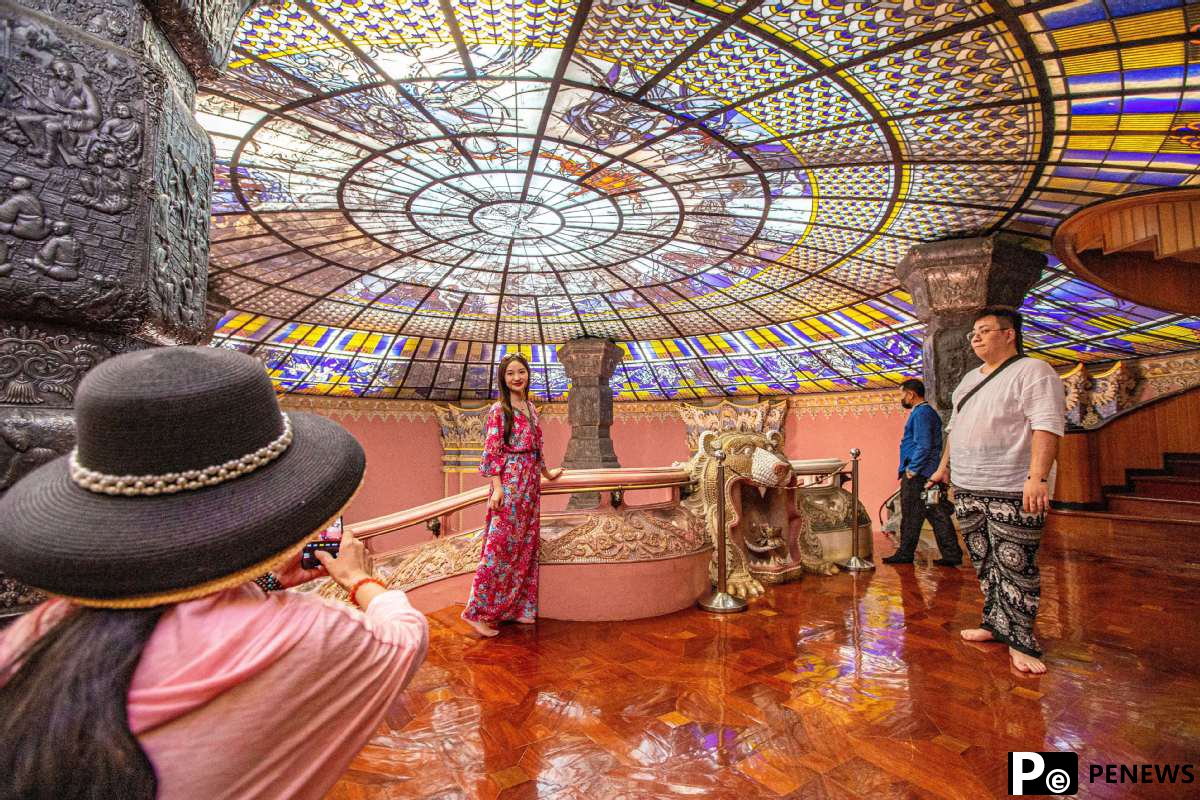Home>>
Chinese hotel chains expand overseas operationsBy Yang Feiyue (China Daily) 08:16, July 24, 2024

Chinese tourists relax at a resort in Kota Kinabalu, Malaysia, on April 4. CHINA DAILY
Since the country's outbound tourism market started to show signs of a steady recovery last year, a number of domestic hotel chains have begun expanding their overseas operations to cash in on Chinese travelers' wanderlust.
They have already made strong inroads in Japan, South Korea and Southeast Asian countries, the first nations to embrace the increasing arrivals of Chinese travelers.
Last September, iElectronic Sports Hotel announced it would construct its first overseas facility in the Malaysian capital, Kuala Lumpur.
The new hotel, which aims to attract esports enthusiasts, has made a total investment of 20 million yuan ($2.75 million) and will offer more than 80 guest rooms.

Chinese tourists visit the Erawan Museum in Samut Prakan, Thailand, on March 1. (WANG TENG/XINHUA)
Malaysia is a travel destination favored by Chinese travelers, making it an ideal first spot for iElectronic Sports Hotel to expand internationally, said Yuan Yang, founder of the Beijing-based company, which was established in 2019 and focuses on providing accommodations for esports fans. It now has more than 150 hotel operations in over 100 cities in China.
But the Kuala Lumpur hotel is not only for Chinese and other international visitors. Through its tailored facilities, it is also hoping to attract Malaysian guests eager to stay and immerse themselves in an e-sport environment.
Malaysia has over 1 million game users, all of whom are loyal fans of Chinese e-sports games, according to a report by Peking University's Institute of Area Studies.
Germany-based data analysis company Statista predicted that the number of e-sports players in Malaysia will see rapid growth, and reach 9.5 million by 2027.
Baez Yang, a representative of the hotel project, said it is a one-of-a-kind development in Malaysia, and aligns with the Belt and Road Initiative.
"It not only fills a gap in Malaysia's e-sports industry but also injects new vitality into the local market. In the future, it could become a local chain brand, driving development in Malaysia's e-sports industry," Yang said.
Among its features, the Kuala Lumpur hotel will have a top-floor garden that enables guests to enjoy coffee and drinks while using the highest-spec e-sports equipment to play popular games like Honor of Kings and Dota for free.
Immersive experiences will also be offered through themed decor, designed spaces, smart-lighting control, and cinema systems, Yang said.
More hotels catering to e-sports enthusiasts are likely to be established in other Malaysian cities as well as Vietnam, Thailand, and the Middle East, the company said.
Zeng Bowei, a senior official from the China Leisure Association, said the hotel is setting an example for other Chinese hotel operators to follow abroad.
"From a global perspective, when Chinese domestic hotels reach a certain level of development, going global becomes an inevitable trend," Zeng noted.
Emerging markets
Elong Hotel, a hotel management unit of Hong Kong-listed online travel company Tongcheng-Elong, plans to have a facility in Jakarta, Indonesia, up and running by the end of this year.
"The hotel will offer the same high-quality products and services as in China, ensuring that travelers can experience the same familiar living environment overseas," said Zhou Qunxia, brand manager of Elong Hotel, which has more than 4,000 operations across the country and 20 million guest members.
The hotel's offerings will include premium bedding, comprehensive guest amenities, and butler service, Zhou said.
"At the same time, the hotel will also consider local customs and preferences to provide localized services," she said.
Elong Hotel already has hotels in Tokyo and Osaka in Japan, as well as Cambodia.
Southeast Asia, Japan, and South Korea are the first choices for Elong Hotel, when it comes to locations for expanding its operations, Zhou said.
"Compared with the saturated hotel markets in Europe and the United States, these emerging markets are in a booming development phase and are still largely untapped," Zhou explained.
"The rapid economic growth in these emerging markets and the increasing demand for outbound tourism from Chinese travelers since last year provide vast opportunities for the hotel industry," she added.
The governments of these countries have offered tax incentives and investment subsidies to attract foreign investment and promote tourism development, creating a favorable environment for establishing and operating a hotel, Zhou said. With the introduction of favorable visa policies and the growing eagerness of Chinese people to travel, the outbound tourism market has seen a good recovery, she added.








